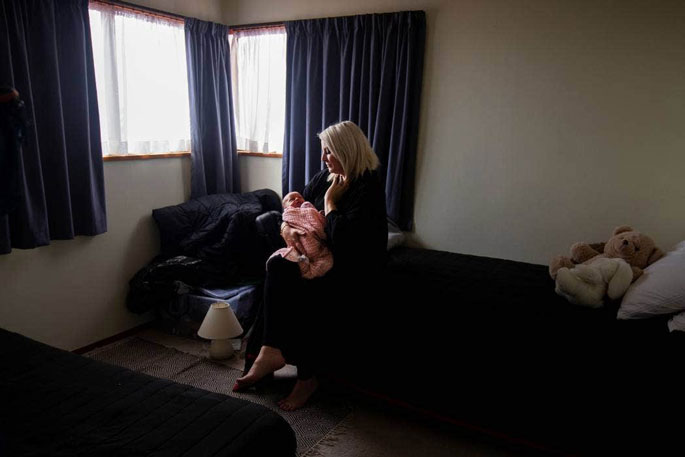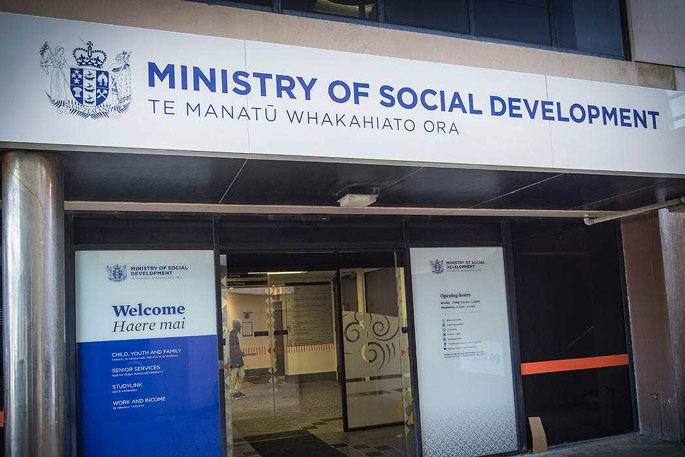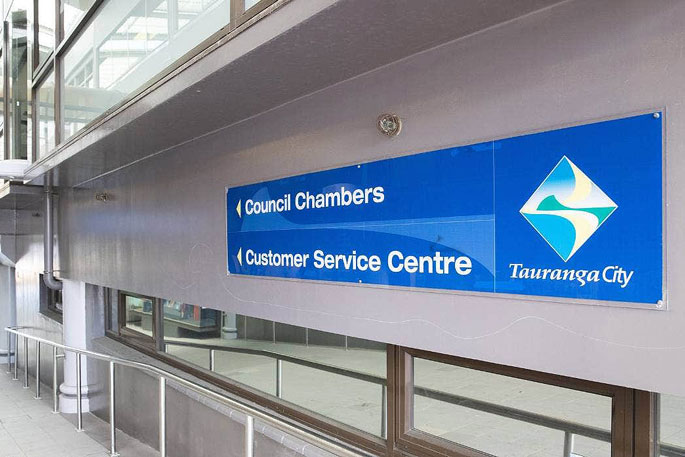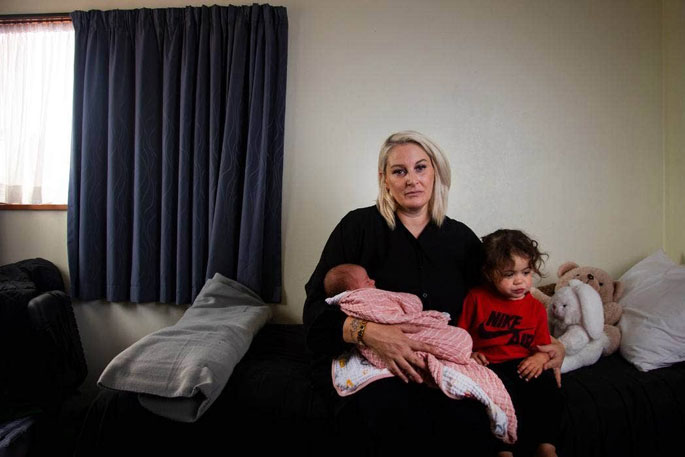A pregnant woman with cancer who went into labour in a Work and Income office while seeking urgent help was told to look for her own accommodation despite being 'bent over and in excruciating pain from contractions”.
Tauranga woman Jemma Webb, who is now living in a motel unit with her newborn baby and six other children after her family became homeless, spoke out about her experience to highlight the reality of the city's housing crisis.
'I am deeply shocked by our whole situation,” says Webb.
'I feel for anyone that has to go through this. As a mother I get up every day and keep going for my kids, but I'm breaking inside. I just want to settle my children into their own beds, in our own home with our routine and enjoy our new addition.”
Webb and her children were made homeless at the end of July when she was heavily pregnant with her seventh child.
She has chronic myleoid leukaemia – a rare blood cancer that affects her immune system, causes extreme tiredness and requires ongoing treatment including oral chemotherapy.
After spending two days trying to contact Work and Income by telephone, she visited the Mount Maunganui office to say she urgently needed help.
Webb says she was due to give birth imminently, had nowhere to stay, and had no clothes or food for herself or her six children who all had to leave the family home quickly due to an emergency situation.
While in the office, Webb went into labour.
'I was having rapid, intense contractions,” she says. 'I was already three centimetres dilated by then, and feeling like my waters would burst. I was bent double in excruciating pain, and all the time I was trying to explain the urgency of the situation.”
Despite the circumstances, Webb says she was told that they could not help because she did not have an appointment.
The earliest appointment she was offered was two days later.
In the meantime she was told to seek accommodation herself so that she could get a written quote for the rent to supply at her appointment.
'I was in a panic as I needed to find somewhere quickly,” says Webb.
'I was in early labour running around with six children trying to sort something – anything – and trying to get access to our belongings. It seemed like no one would help.”
 Jemma Webb is in emergency accommodation in a Tauranga motel with her newborn baby and her six other children. Photo: Alan Gibson/Stuff.
Jemma Webb is in emergency accommodation in a Tauranga motel with her newborn baby and her six other children. Photo: Alan Gibson/Stuff.
'I nearly had the baby on the spot when I heard what the rent would be, but it was all I could find,” she says.
Webb gave birth at Tauranga Hospital at 8.50pm the next day, but had to leave with her newborn daughter at midnight just hours later so she could look after her other children.
'The next morning I got a call from Work and Income to say they had approved the emergency accommodation, so we were able to move in there,” she says.
'I'm grateful for a roof over our heads, but it's no place for a newborn baby. It's not safe for little ones, and they can't play outside or make any noise. Plus it's insane that the government is paying millions for people to be in motels when they want to be able to rent their own houses.”
Webb found a motel that had a three-bedroom unit, but the rent is $3400 a week.
Since she gave birth two weeks ago, Webb has applied for more than 35 rental houses and has been rejected every time.
'Until you experience it, you don't realise how bad it is,” said Webb. 'So many people are in this situation – people who have become suddenly homeless and just can't find anywhere to live because there are just not enough houses and the rents are so high.”
During her hunt for a rental so far, Webb says she feels discriminated against because she has children.
'I think many landlords definitely do not want people with children.
'Or people who have been in emergency housing or are on accommodation benefit. Before people judge me, I worked right up to a few months before giving birth.
'When I had my children I was in a good financial position with my now ex-partner. I had furniture and possessions – all that stuff – but I'm now in a situation where I don't. There are so many people quick to rush to judgement.”
Webb says her benefit had also been reduced by 25 per cent, which she was told is the rule as she is in emergency accommodation.
She understands that Work and Income will provide an accommodation supplement of $300 per week towards a $650 per week rental.
'Good luck with finding that $650 rental,” she says. 'There are hardly any at that price. Every house I go for seems to have hundreds of people going for it.”
Webb says her mental health has suffered due to the pressures of being homeless and looking after a newborn as well as her other children.
'I haven't stopped since giving birth,” she says.
'I can't just enjoy my baby. We aren't even allowed visitors here except professionals. I am so stressed, anxious and depressed.
'I feel like I've failed my children. There are no breaks, no reprieve, and I feel like I have to spend every day trying to find a house, doing school/daycare drop-offs, or going to different parks to try to entertain them with a two-week-old baby in tow.
'We are lucky to have what we have, which is a three-bedroomed motel unit. I had no idea the housing shortage was this bad. I've never been in a position like this in my life.”
She also has to resume her treatment for leukaemia, which includes medication and, if necessary, chemotherapy and blood transplants.
'There are so many more mountains to climb,” she said, 'all of which would be so much easier in our own home.”
Webb's counsellor, who Stuff has not named for privacy reasons, says she's shocked at how hard it has been for Webb to access help.
”I don't know what could be more urgent than a woman in labour, homeless, with cancer and young children to look after,” she said. 'It seemed like madness that she had to spend days trying to get help and, even when in labour, had to go and look for a house herself.
'She and her children did not even have clothes. It highlighted to me how much demand there is for support systems – especially in housing – and how hard it can be for people in vulnerable situations to access help. Jemma is an incredible woman and mother.”
Since Stuff contacted the Ministry of Social Development, Webb says she has received several calls from them.
Bay of Plenty acting regional commissioner Karen Hocking says the agency could have done more to help, and done it sooner.
'We sympathise with Jemma's situation regarding the sudden loss of her rental property.
'We've reviewed our support for her, and we believe we should have offered her more support earlier.”
Hocking says that Work and Income will be working with Webb to make sure she has 'all available support”.
'We have been back in touch with her to make sure she has what she needs for her family and her newborn.
'We have also referred her to local navigator services to provide her with wrap around support.”
 Tauranga woman Jemma Webb said it took days to get help from Work and Income despite the urgency of her situation. Photo: Grant Matthew/Stuff.
Tauranga woman Jemma Webb said it took days to get help from Work and Income despite the urgency of her situation. Photo: Grant Matthew/Stuff.
Hocking says the agency was contacted by Webb on July 26.
At that time, Webb asked about emergency housing as she could no longer stay at her rental.
She was referred to the Whakatāne service centre for an appointment regarding emergency housing.
'A case manager made contact with Jemma on July 26 and learned that she had already made an appointment with the Mount Maunganui service centre for July 29,” says Hocking. On July 27 Jemma came into the service centre to ask for an earlier appointment.”
Hocking says the agency understood that Webb was able to stay with her mother in Mount Maunganui, which Webb says she was unable to do as her mother did not have space and was caring for her partner, who has cancer.
After giving birth, an emergency housing grant was approved along with an additional $600 sole parent payment and food assistance of $200.
'Demand for housing is high in the Bay of Plenty – as it is across all Aotearoa,” says Hocking.
'We do not have control of the supply of accommodation. We have a range of financial supports to help people find suitable accommodation.
”We will be assisting Jemma by assessing her for public housing and putting her in touch with a housing navigator, to provide additional support. We will also use our housing broker service to connect with local landlords and promote our clients as tenants.
'We have been in touch with the Salvation Army to help source transitional housing, however they advise they have nothing suitable.”
The Bay of Plenty was recently revealed to be the most expensive place in New Zealand to rent a home, with rents of up to $1500 a week and high demand for rental properties.
In June, the Bay of Plenty's median weekly rent reached a record high of $610, marking an 11 per cent year-on-year increase and surpassing both Auckland and Wellington for the first time, according to Trade Me's rental price index.
 Tauranga City Council acknowledged that managing the rapid growth of the city was a significant issue. Photo: Christel Yardley/Stuff.
Tauranga City Council acknowledged that managing the rapid growth of the city was a significant issue. Photo: Christel Yardley/Stuff.
Rental property is in high demand with houses attracting hundreds of enquiries, agents said. Competition for rentals is also driving up prices, with more houses frequently listed at over $1000 per week.
According to the latest monthly housing update collated by the Ministry of Social development, there are 594 households – measured by family not individual – in emergency housing in the Bay of Plenty last month.
The report shows the region, which includes Taupō, has the third-highest number of people in emergency housing in the country, after Auckland and Waikato.
In July, the government spent $30 million funding emergency housing for people through Special Needs Grants.
The total number of households in emergency housing in the country was 3978, comprising 4474 adults and 3813 children.
Other government data on emergency housing in the country's individual territorial authorities showed at the end of the first quarter of this year, Tauranga city alone had 183 adults and 216 children in emergency housing.
Tauranga City Council acknowledges that managing the rapid growth of the city is a significant issue.
Minutes obtained by Stuff from a recent council meeting that discussed progress in various development projects, reveals that Tauranga is the only city in New Zealand that has not been able to meet its obligations under the government targets for urban growth and development.
In turn, this could impact the council's ability to access government funding.
Tauranga's population has doubled in the past 30 years to more than 150,000 residents and 58,000 dwellings.
According to council estimates, this trend is expected to continue, with the population expected to increase to 210,000 in the next 30 years.
While council claims there's sufficient planned and identified development capacity to accommodate the city's growth, the plans are not turning into houses at the 'pace and urgency that is required”, with council blaming 'current legislation and processes”.
The new Te Tumu coastal development in Pāpāmoa East, for example, has been hindered by delays, and houses might not be built until 2030.



1 comment
Wow 7 Kiddies
Posted on 20-08-2022 07:34 | By Thats Nice
Why is the demand for housing so high when a lot of people have left NZ on a one way ticket? Maybe because 1st home buyers now can't buy their first home due to rule changes so they have decided renting is their only option?? I don't envy the grocery bill of this single mum with 7 children as that's a lot of mouths to feed.
Leave a Comment
You must be logged in to make a comment.